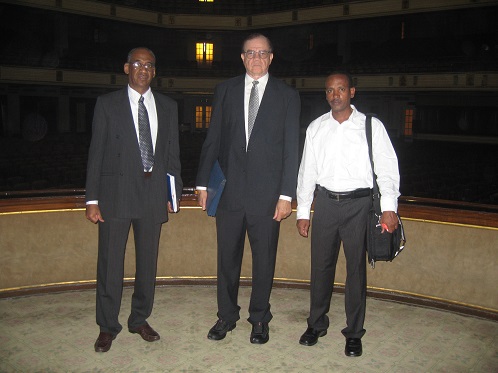Wednesday, September 26, 2007

PRINCESS ANNE, MD – The African Language Project at the University of Maryland Eastern Shore has received three grants in one year from the National Security Agency to continue extensive research and the formulation of corpuses and readers within several less commonly known languages in Africa.
During a recent trip to Egypt, a UMES research team comprised of UMES African Languages Research Project Director Dr. Chester Hedgepeth, logistical expert Dr. Malik B. Malik and student and special assistant MaarofSanad worked collaboratively with Cairo University and the American University in Cairo to further develop a reader and the building of a lexicon in Arabic and to share research in machine translation of the same. Cairo and American University officials are excited about the corpus building activities of the UMES team. All parties involved are working toward the development of a memorandum of understanding that will facilitate Egyptian Arabic corpus building research and machine translation.
“Vice presidents, deans and chairs at the African universities expressed their great excitement at being associated with the University of Maryland Eastern Shore,” said Dr. Chester Hedgepeth, director of the UMES African Languages Research Project. “They are hungry for the research we are doing in machine translation.”
The next milestone occurs when key officials from the African universities realize their plans to attend UMES’ fifth annual International African Languages Conference in May 2008. There they will present papers and begin the formulation of a focused memorandum of understanding between UMES and the African Languages Department in Cairo.
Over the years, the UMES’ African Languages team has amassed concept words (that exist in society and are used every day) in various African languages. In Africa, there are more than fifteen hundred different languages. Additionally, in most of the African countries and states (particularly in Nigeria) there are many regional dialects, which are different versions of the same language. Political issues and conflicts arise from the fact that the people who speak those dialects believe that theirs is the official dialect. The team at UMES is charged with deciding which dialects will fulfill the greatest need and therefore which dialects demand more codified supplements, like dictionaries and indices and other types of literary or linguistic material to fill in the gaps.
Readers have been published in Yoruba, the major language of Western Africa and spoken primarily in Nigeria; in Hausa, the major language in the Northern region of Nigeria; in Lingala, the language of Zaire; in Sudanese Arabic, a language of Sudan; in Igbo (also spelled ‘Ibo’), one of the four major languages of Sierra Leone; in Wolof, which is a Senegalese language; in Akan, the major language of Ghana; and most recently in Urhobo, also spoken in Nigeria.
“UMES is the only university in the country focusing on machine translation and corpus building in African languages,” said Hedgepeth. “We are reaching out nationally and internationally, and people are hungry for this type of research.”
Hedgepeth has recently been named acting chairman of the Department of English and Modern Languages, a post he held previously for some 10 years in the late eighties and early nineties. For the African Languages Project, he ix

